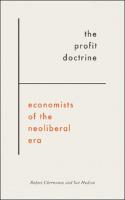The Profit Doctrine
Economists of the Neoliberal Era
Author(s)
Chernomas, Robert
Hudson, Ian
Collection
Knowledge Unlatched (KU)Number
100053Language
EnglishAbstract
The economics profession has a lot to answer for. After the late 1970s, the ideas of influential economists have justified policies that have made the world more prone to economic crisis, remarkably less equal, more polluted and less secure than it might be. How could ideas and policies that proved to be such an abject failure come to dominate the economic landscape?
By critically examining the work of the most famous economists of the neoliberal period including Alan Greenspan, Joseph Stiglitz and Paul Krugman, the authors Robert Chernomas and Ian Hudson demonstrate that many of those who rose to prominence did so primarily because of their defence of, and contribution to, rising corporate profits and not their ability to predict or explain economic events.
An important and controversial book, 'The Profit Doctrine' exposes the uses and abuses of mainstream economic canons, identify those responsible and reaffirm the primacy of political economy.
Keywords
Economics; Neoliberalism; economics; Milton Friedman; Alan Greenspan; Joseph Stiglitz; Paul Krugman; Public choice; UnemploymentDOI
10.26530/oapen_625287ISBN
9781783719938OCN
968727119Publisher
Pluto PressPublisher website
https://www.plutobooks.com/Publication date and place
2016Grantor
Imprint
Pluto PressClassification
Central / national / federal government policies


 Download
Download